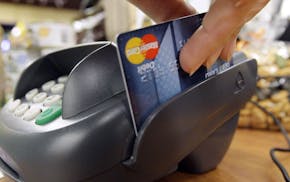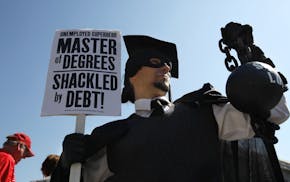Last week's dose of good news on the jobs front silenced, at least for the time being, the unjust battering corporate America has endured over the slow pace of new job creation.
But qualifiers and hedges have dogged every ponderous step of this economy's climb from the abyss, and enough of them remain to ensure that good news will soon be followed by bad. When that happens, business owners will again find themselves derided as a bunch of coupon clippers who are willing to "sit" on $2 trillion in cash rather than invest in new plants, new technology and, most especially, new workers.
President Obama gave voice to this sentiment last month, in an address to the U.S. Chamber of Commerce, where he implored executives to unlock the corporate treasury and invest in America. "I just want to encourage you to get in the game," he said.
Some people imagine a world without strife, but I'd be willing to settle for a universe in which everyone has studied enough accounting to understand the difference between an income statement and a balance sheet.
Half of the argument about corporate cash is correct. According to the Federal Reserve Bank, nonfinancial companies had liquid assets of $1.93 trillion at the end of September 2010. That's an all-time high.
But that's like saying a $5,000 cash advance from my credit card has left me richer. Yes, I have more cash to put to work. But I also have more debt to work off.
You can't talk about corporate assets without also talking about liabilities, the middle third of the balance sheet. And, as you probably guessed, that's at record levels too. Nonfinancial firms borrowed an additional $305 billion during the third quarter of 2010, bringing their total debt to $7.3 trillion.
So it goes on corporate balance sheets. Cash doesn't always equal free cash. And even free cash usually has some claims on it.
At Ecolab, the $6 billion St. Paul-based maker of cleaning, sanitation and food safety products, cash on the balance sheet rose from $67 million at the end of 2008 to $242 million at the end of 2010, even as the number of people it employs was virtually unchanged.
There are good reasons for that. Even though Ecolab reported record fourth-quarter profits, its annual sales were virtually unchanged from two years ago. The company has used its cash to shave almost $300 million in debt, with more coming due. It pumped $100 million into its employees' pension fund, spokesman Michael Monahan said, and closed on an acquisition Friday.
"We're putting that cash to work by investing in growth for the future," Monahan said.
The recession was a reckoning for most American households. Their single biggest investments, their homes, were plunging in value. Cheap and easy credit had evaporated, and the bills were coming due. Faced with that scenario, we did the prudent thing and became much more cautious about our spending while trying to shore up personal balance sheets.
Those events were no less searing for business owners and executives. Demand for their products withered, and the credit lines that may have allowed them to ride out a rough period in earlier years were amended, cut or pulled altogether, leaving them with little choice but to shed workers. From peak employment to the bottom point of the recession, employers cut more than 6 percent of all jobs -- by far the deepest plunge since the Great Depression.
Forget the cheap and easy stereotypes: For most businesses, this was more about survival than corporate greed. Since then, well-run companies have been doing their best to repair their balance sheets and to ensure they are better prepared to weather a similar downturn in the future.
Graco, a Minneapolis-based manufacturer of fluid handling equipment, has reduced its long-term debt to $70 million, from $180 million at the end of 2008. Sales rose 28 percent last year, and the company even added 100 jobs worldwide. But employment still remains below where it was two years ago, and for good reason: Almost $100 million in revenue evaporated during the recession. The company's total equity -- its net worth -- remains lower than it was at the end of 2006.
Things are much better for consumers and businesses, but this recovery still feels fragile enough to go off the rails. All it would take is one big provocation, or a lot of small ones.
Just on Friday, oil prices rose to near $103 a barrel and the Labor Department reported that average hourly earnings were unchanged in February. Neither bodes well for robust economic growth, and in this context businesses should be praised for their caution, not condemned for it.
ericw@startribune.com • 612-673-1736

Wieffering: Time to get over debit card fees
For Thrivent and others, warnings were there

With billions in sales, some co-ops are big business

